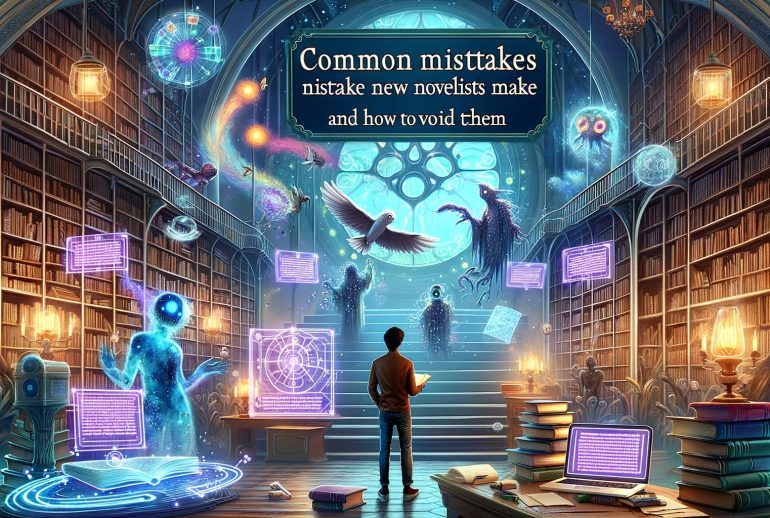Writing a novel is a creative and fulfilling endeavor, but it can also be a challenging one, especially for new novelists. While everyone’s writing journey is unique, there are common mistakes that many beginners tend to make. In this comprehensive article, we will explore these common pitfalls and provide practical advice on how to avoid them, helping aspiring authors navigate the path to becoming successful novelists.
Section 1: Lack of Planning and Preparation
Mistake 1: Skipping the Planning Phase
Many new novelists dive into writing without a clear plan. While some writers thrive on spontaneity, having a basic outline or roadmap for your story can save you from potential pitfalls down the road.
Solution: Outline Your Story
Create a rough outline of your novel, outlining key plot points, character arcs, and major events. This provides a solid foundation and helps you stay on track during the writing process.
Mistake 2: Neglecting Character Development
Weak or underdeveloped characters can hinder your story’s impact. New novelists often focus more on plot and neglect their characters.
Solution: Create Well-Rounded Characters
Invest time in developing your characters. Understand their motivations, backgrounds, and unique qualities. This will make them relatable and engaging to your readers.
Mistake 3: Unrealistic Expectations
New novelists sometimes underestimate the time and effort required to complete a novel. They may expect instant success or overlook the revision process.
Solution: Set Realistic Goals
Recognize that writing a novel is a long-term endeavor. Set achievable goals, and understand that success often comes after multiple drafts and revisions.
Section 2: Writing and Style Mistakes
Mistake 4: Overusing Adverbs and Adjectives
New writers often rely heavily on adverbs and adjectives to describe actions and scenes, leading to clunky and excessive prose.
Solution: Choose Strong Verbs and Precise Descriptions
Replace weak verbs with strong ones and opt for precise, vivid descriptions rather than piling on adverbs and adjectives. Show, don’t tell, whenever possible.
Mistake 5: Ignoring Show, Don’t Tell
Another common mistake is telling readers what’s happening instead of showing it through actions, dialogue, and sensory details.
Solution: Engage the Senses
Create scenes that allow readers to experience the story through the characters’ senses. This immerses readers in the narrative and makes it more engaging.
Mistake 6: Inconsistent Point of View
New novelists may struggle with maintaining a consistent point of view throughout their story, leading to confusion for readers.
Solution: Choose and Stick to a Point of View
Decide on a point of view (first-person, third-person limited, omniscient, etc.) and stick with it throughout your novel. Consistency is key for reader comprehension.
Section 3: Plot and Structure Errors
Mistake 7: Weak Story Structure
Some new novelists struggle with structuring their stories, leading to plots that lack tension or direction.
Solution: Learn Story Structure
Study popular story structures like the three-act structure or hero’s journey. These frameworks provide a solid foundation for your plot.
Mistake 8: Lack of Conflict
A story without conflict lacks tension and interest. New writers may have trouble introducing and maintaining conflict.
Solution: Introduce Conflict Early
Establish conflict early in your story and ensure it escalates throughout. Conflicts drive the plot and keep readers engaged.
Mistake 9: Neglecting Pacing
Pacing issues, such as slow starts or rushed endings, can disrupt the reading experience.
Solution: Balance Pacing
Maintain a balance between action and reflection. Ensure that key events occur at appropriate intervals to keep the story flowing smoothly.
Section 4: Editing and Revision Mistakes
Mistake 10: Skipping the Editing Phase
Some new novelists rush to publish without thorough editing, leading to grammatical errors, inconsistencies, and plot holes.
Solution: Edit Ruthlessly
Take your time to revise and edit your manuscript. Consider seeking feedback from beta readers or hiring a professional editor.
Mistake 11: Ignoring Feedback
New writers may resist feedback or feel discouraged by criticism.
Solution: Embrace Feedback
Feedback is essential for growth. Be open to constructive criticism, and use it to improve your writing skills.
Mistake 12: Not Reading Widely
Neglecting to read widely can limit your understanding of different writing styles and storytelling techniques.
Solution: Read Diversely
Read books across various genres and styles to expand your literary knowledge and gain inspiration for your own writing.
Section 5: Perseverance and Mindset
Mistake 13: Giving Up Too Soon
Many new novelists face rejection or self-doubt and abandon their writing dreams prematurely.
Solution: Develop Resilience
Understand that rejection is part of the writing journey. Keep honing your craft, seeking improvement, and persevering in the face of setbacks.
Mistake 14: Waiting for Perfect Conditions
Some aspiring authors wait for the “perfect” time to write, which may never come.
Solution: Write Consistently
Establish a writing routine and commit to it, even when conditions aren’t ideal. Consistency is key to completing your novel.
Conclusion
Writing a novel is a challenging but rewarding endeavor, and new novelists often encounter common mistakes along the way. By understanding these pitfalls and implementing the provided solutions, you can navigate the writing process more effectively, improve your storytelling skills, and increase your chances of success as a novelist. Remember that every writer’s journey is unique, and learning from your mistakes is an integral part of becoming a better writer. Embrace the process, stay persistent, and keep honing your craft.



